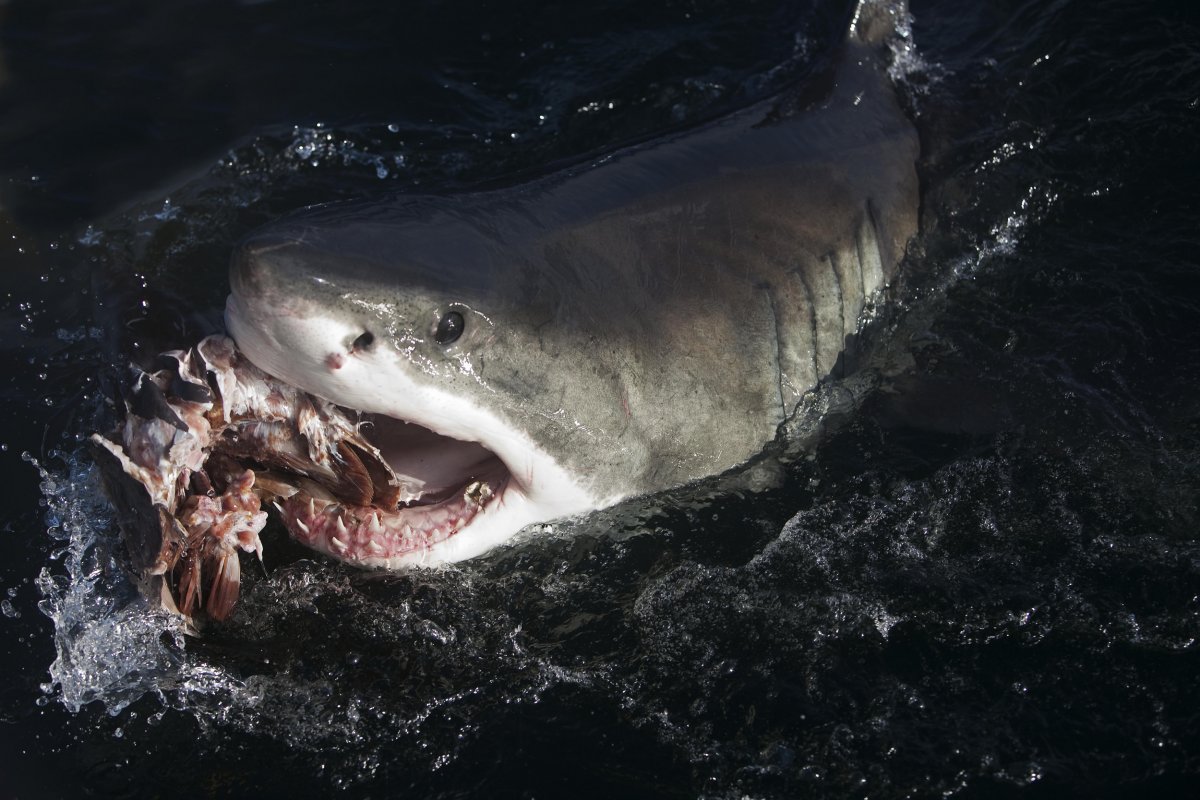A "very chunky" great white shark that had probably just eaten a large dinner was spotted in video footage off Cape Cod, Massachusetts, on the U.S. East Coast.
The image of the bloated shark was posted to Facebook by the marine research non-profit Atlantic White Shark Conservancy (AWSC) on Wednesday.
"There are some sharks that make our data team stop and take a double-take," the AWSC said in the post.
"One of our data team members was analyzing GoPro footage, they came across this very chunky, male, white shark. Our data team can assume that the shark recently ate due to the size of its stomach."
Great white sharks don't chew their food—instead, they usually rip off large chunks of flesh from their prey and swallow them whole.
Newborn great white sharks tend to feed on fish and other sharks, according to the Encyclopedia Britannica.
But when these animals reach adulthood, their prey includes sea turtles, seals, sea lions, porpoises, dolphins and even small whales.
Judging by the size of the bulge in the shark's belly, the meal was likely a large animal.
"We don't know for sure what he ate but given the size of his stomach and the fact the footage was collected in the nearshore waters off Cape Cod, it was likely a gray seal," a spokesperson for the AWSC told Newsweek.
"White sharks are opportunistic predators that feed on a wide variety of prey species but come to Cape Cod every summer and fall to feed on seals, which have a thick layer of energy-rich blubber. The seals that live here are big animals in their own right—they can weigh hundreds of pounds—and are a big meal for a white shark!"
The white shark in question is an eight-foot-long male known to scientists as "Scooby" after the white pattern on its tail, which looks almost like a dog's face, according to the spokesperson.
Great white sharks, which tend to grow to between 11 and 16 feet in length, usually hunt by ambush, attempting to take their prey by surprise and inflict a fatal bite.
But these apex predators are also known to scavenge opportunistically on the carcasses of dead whales and basking sharks.
See posts, photos and more on Facebook.
Several great white sharks were spotted feeding off the carcass of a dead humpback whale near Cape Cod earlier this year.
According to the AWSC, the waters around Cape Cod have become an aggregation site for great white sharks in the North Atlantic in recent years.
The animals gather in the area in significant numbers every year to hunt seals—whose population has also exploded recently, according to the AWSC.
The non-profit said that sightings and records of catches in the broader northwest Atlantic have increased, indicating some level of population recovery, although the true extent of the population remains uncertain.
Great white sharks were classified as a protected species in most federal waters in 1997, and in Massachusetts state waters in 2005. Before that, the sharks were hunted.
Some researchers have suggested that the apparent population recovery in recent years is tied to the the increase in the regional seal population.
Marine research organization OCEARCH, which tracks sharks around the world, has said that there may be two sub-populations of white sharks in the northwest Atlantic based on evidence from monitoring data.
"The two sub-populations are distinguished by which late summer and fall feeding aggregation site they utilize," Chris Fischer, OCEARCH's founding chairman and expedition leader, previously told Newsweek. "One sub-population aggregates during the late summer and fall in Cape Cod and the other population aggregates in Atlantic Canada."
Update 11/10/21, 9:20 a.m. ET: This article was updated to include comments from the Atlantic White Shark Conservancy.

Uncommon Knowledge
Newsweek is committed to challenging conventional wisdom and finding connections in the search for common ground.
Newsweek is committed to challenging conventional wisdom and finding connections in the search for common ground.
About the writer
Aristos is a Newsweek science reporter with the London, U.K., bureau. He reports on science and health topics, including; animal, ... Read more
To read how Newsweek uses AI as a newsroom tool, Click here.








